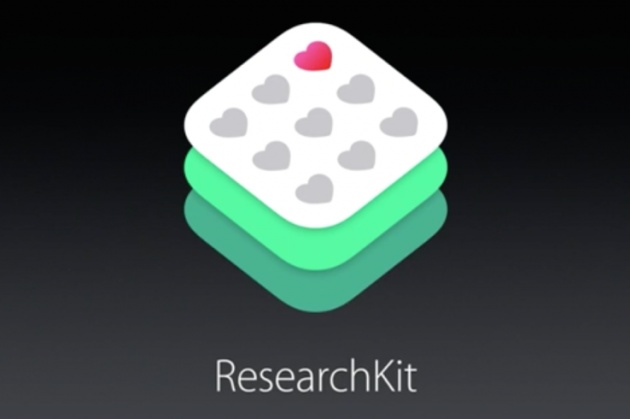
This week Apple bundled a big announcement inside it’s long awaited Apple Watch ‘Spring Forward’ event. Namely the launch of ResearchKit: an iOS software framework that lets people, currently U.S.-based only, volunteer to join medical research studies. This is arguably a lot more interesting than expensive, Internet-connected wrist wear.
While the question of what problem the Apple Watch specifically fixes continues to preoccupy commenters, ResearchKit’s raison d’être is clear: medical research needs data, and iPhones offer the promise of a populous pipeline that can get more data flowing to the scientific community.
The first group of apps developed using ResearchKit — and announced on stage at Apple’s event — are for studies on asthma, breast cancer, cardiovascular disease, diabetes and Parkinson’s disease.
ResearchKit is open source. Apple says it intends to release the framework next month, allowing researchers to contribute to specific activity modules, such as memory or gait testing within the framework, and share them with the global research community to advance disease research.
This is not just about leveraging iOS device connectivity as an alternative to administering tedious and time-consuming paper-based studies. But also using specific sensing hardware that people already have in their pocket as a diagnostic testing tool — be it data inputted via the touchscreen, or via measurements from the accelerometer (for instance to test physical gait stability) or even the microphone (as way to gauge lung capacity).
The consistency of iOS hardware (when compared to the far more diverse Android ecosystem) is likely to be helpful in a research scenario — certainly to some types of studies that rely on taking measurements from mobile device sensing hardware. ResearchKit apps work on iPhone 5, iPhone 5s, iPhone 6, iPhone 6 Plus and the latest generation of iPod touch devices.
Studies can also be extended beyond iOS hardware via gathering data from third party health-monitoring wearables and other devices that are connected to Apple’s ecosystem via its HealthKit framework. (Apple’s own Health app was already taking a granular approach to personal medical data, with some sixty types of health data contained in its repository.)
The big promise of ResearchKit is scale, given that research studies will have the chance to reach more people than they might otherwise, with iOS users running into the multi millions globally.
“iOS apps already help millions of customers track and improve their health. With hundreds of millions of iPhones in use around the world, we saw an opportunity for Apple to have an even greater impact by empowering people to participate in and contribute to medical research,” said Jeff Williams, Apple’s SVP of operations, in a statement at the launch. “ResearchKit gives the scientific community access to a diverse, global population and more ways to collect data than ever before.”
The app format also minimizes obstacles to participation in research studies, compared to, say, asking participants to submit information via paper forms. Studies delivered via apps can also utilize established mobile tools, such as push notifications, to maintain engagement from participants — so might be able to run for longer, or pull in more consistent data (in theory).
Early signs are promising for ResearchKit uptake, although it will be interesting to see what happens with apps that are launched outside the halo of an Apple product announcement. And once more studies are live competing for participants.
Signing up to a ResearchKit study is done with a digital signature, via a finger on the touchscreen. And researchers can use the ResearchKit framework to present what Apple describes as “an interactive informed consent process”.
Concerns about this process have already been raised — given that there’s nothing to stop minors lying about their age, for instance, in order to sign up to studies without gaining parental consent (as The Verge notes there’s no age verification as yet, albeit that’s something that could be added in).
But this is exactly the sort of balancing act that ResearchKit apps will have to strike: increasing participation in medical research by mobile means inevitably requires some loosening of controls over how participants join a study, since they are not attending a clinic in person. However for the data to be meaningful — and ethical — some checks and balances are obviously needed.
(It’s worth noting that Apple has updated its developer guidelines since the launch of ResearchKit, to specify that developers conducting human research must comply with applicable laws for each territory the app is made available, and must obtain consent from participants (or from parents or guardians in the case of minors).)
Users are also able to choose which studies to participate in, including sharing only partial data with a particular study if they wish. That element of user control may also help increase participation.
When it comes to privacy, Apple has emphasized it is not itself party to any of the data being shared. That’s a key point, given that medical data is pretty much the most sensitive category of personal data there is. But again concerns have been raised about how rigorously ResearchKit data is being anonymized, and where it might end up.
Sage Bionetworks, which has made several of the early ResearchKit apps and is anonymizing the data before sending it on to the research institutions involved in the first group of studies, told The Verge “we can’t promise perfect anonymity”, adding:
The biggest risk in these studies is to your privacy; we’re going to de-identify it, but because we’re going to make it available for lots of research, there exists a chance that someone could re-identify you.
That’s the sort of caveat we’ve come to expect from digital services handling and sharing user data. The issue here is the data in question is both extremely sensitive and intended to be widely shared for research purposes — amping up the risks if it can indeed be de-anonymized.



